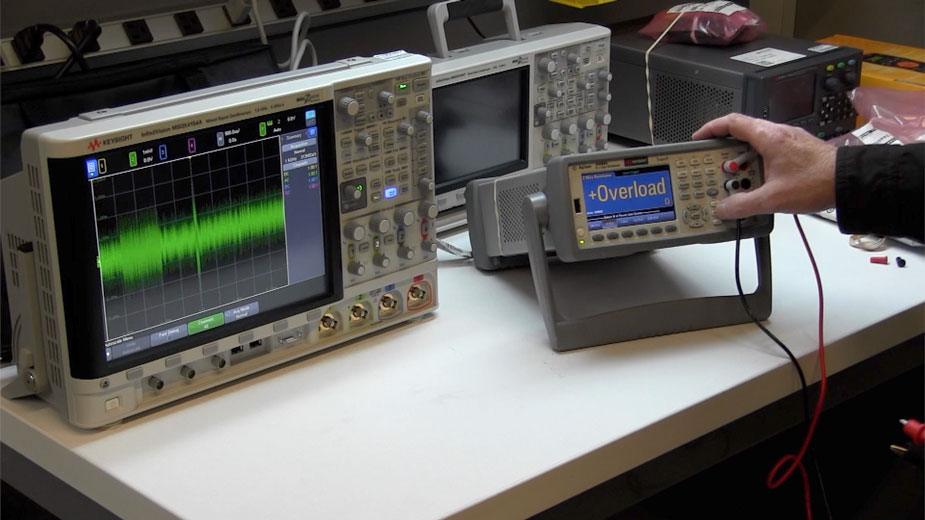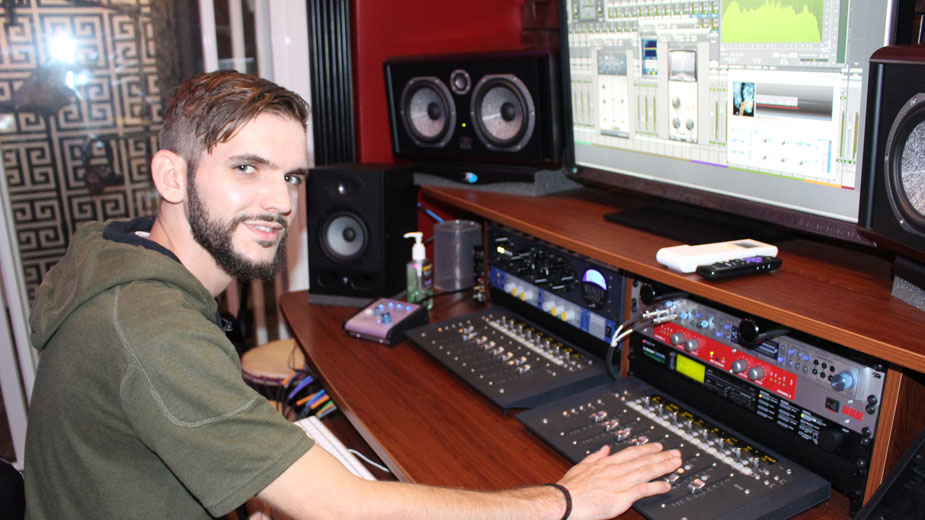A New Generation of Entrepreneurs
As you enter the offices – that is, office – of Connect Technology Co., you’re immediately struck with the sense that you’re on the ground floor of something new and interesting.
On the walls are sheets of oversized yellow paper filled with handwritten ideas born from the latest brainstorming session. A desk holds a laptop computer, while a small brightly colored sofa sits before the far wall. In the middle of the room is a big round beanbag where you can relax and summon the next concept that enters your head.
The names of the principals of the company and their titles are displayed on the office door window – not artfully cut or etched – but rather scrawled in white erasable crayon.
Oh, and all of the officers of Connect Technology have yet to graduate from high school.
“I came into this not knowing what it was going to be like,” says A.J. Hammond, Connect Technology’s chief technology officer. “I really had no interest in business.”
No matter. Hammond and 24 other seniors from high schools in Mercer and Lawrence counties in western Pennsylvania are deep into the Entrepreneurship Academy – known better as the eAcademy – a program housed in the eCenter and Workforce and Training Center at LindenPointe in Hermitage, Pa. Connect Technology works out of its small office in LindenPointe’s Workforce building.
The program enrolls 25 students each year from 10 school districts with the objective of introducing them to the concepts, culture and mindset of entrepreneurship, says Lisa Evans, program director of the eAcademy. “There’s no course that takes you from high school to life, one that teaches you how to make decisions, to be resourceful,” she says. “That’s the goal of this program.”
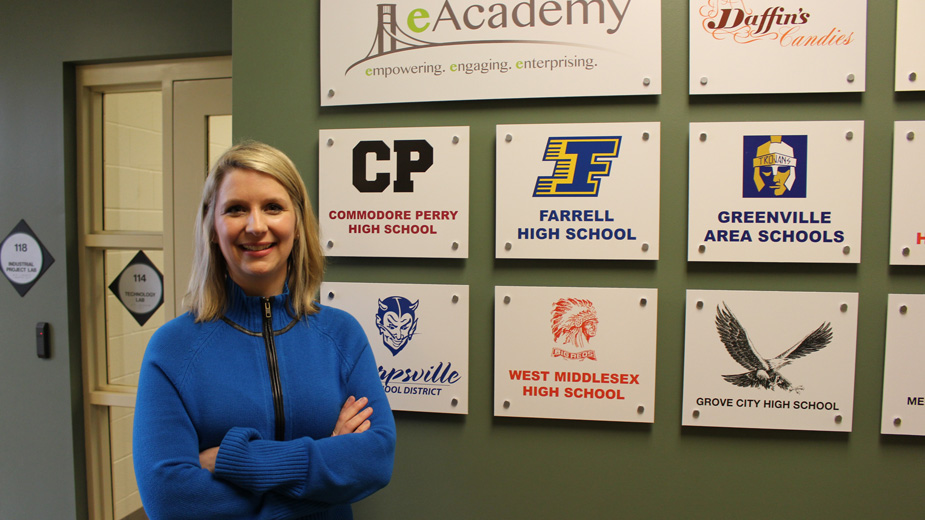
Pictured: Lisa Evans, program director of eAcademy.
Most who enter the Entrepreneurship Academy don’t understand the principles of what it takes to become an entrepreneur, Evans says, or what it takes to nurture your own ideas into a profitable venture, “But they want to try something different,” she says. “They want to bridge that gap between high school and college.”
When they finish the program, these students have gained a better understanding of what it’s like to own and operate one’s own business.
In this case, the students are charged with building a business that offers real products or services.
“Twenty-five percent of the program is lecture and 75% of it is facilitation,” Evans says, and guiding the student teams in developing their companies. Each team has five or six students. “Then, they journey through the process of a startup,” she says.
The premise of Connect Technology is to build small electronic tablets and ship them to underserved areas of the world, Hammond says. “We can make these for less than $30,” he notes, as he shows off a working prototype. “Building the prototype was the first big milestone,” he says. “The business plan is the final problem.”
Hammond is no stranger to computers. The Hickory High School senior was first taught to program at the age of six and his mother had introduced him to computers well before that. “I’ve been on the computer since I could walk and talk,” he says.
Ultimately, Hammond’s goal in life is to start his own cybersecurity firm. The eAcademy has helped him understand the fundamentals of entrepreneurship. “I’ve found a new love for business,” he says. “This has prepared me way better than anything else.”
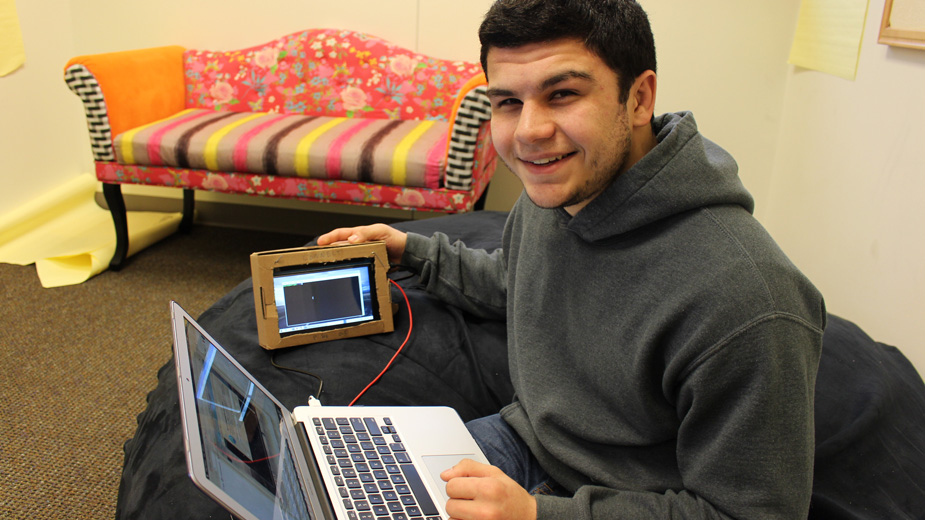
Pictured: A.J. Hammond shows an electronic tablet he’s programmed for Connect Technology.
This is the academy’s fourth year in operation, and it has become a program in high demand among students looking to advance in their career paths, Evans says. A substantial number of seniors in the program are not business majors. They are more interested in engineering or computer science. Aside from lecture and in-class business development, the students are exposed to working companies through visits to businesses throughout western Pennsylvania and northeastern Ohio.
Recently, for example, the class took a field trip to the Youngstown Business Incubator, America Makes and Youngstown State University to get a firsthand look at how advanced manufacturing and 3-D printing are changing the approach to production.
“We’ll go to any business that wants to let us in,” Evans says.
One of the main objectives is to explore the diversity of companies in the region and dispel any notion that the area is void of business and industrial activity. Moreover, it serves to impress the students that they can remain in the region and still make a good living. “CEOs of these companies are vested in keeping young people here,” Evans says.
And that’s one goal of the Entrepreneurship Academy – encouraging young men and women with fresh ideas to stay in the community, says Ketaki Desai, executive director of the LindenPointe Development Corp. “We don’t want talent leaving the region,” she says.
Although the program is based on a similar venture that started in Massachusetts, Desai says she’s not aware of any effort where students participate the entire school year, every day for three hours a day. “We’re a small team that wants to focus on taking this program regionally or even nationally,” she says.
Most education systems lack the resources to provide real-world experience to many of their students, Desai says, emphasizing that it’s not a 9-to-5 world anymore. Indeed, many entrepreneurs today embrace the new “gig” economy where young people essentially create their own jobs, thanks to advances in technology.
Reaching students in this region to shift that mindset is important, Desai says. “There’s a big gap, especially in the rural regions where there’s not a lot of access,” she says. “Everyone sees that the academy fills this gap.”
For many of the students, it’s helped them gain an awareness that they wouldn’t receive in a traditional classroom setting.
Jocelyn Roth, a senior at Hickory and an academy student, is the CEO of Adaptasole, a company that’s developed interchangeable soles for tennis shoes.
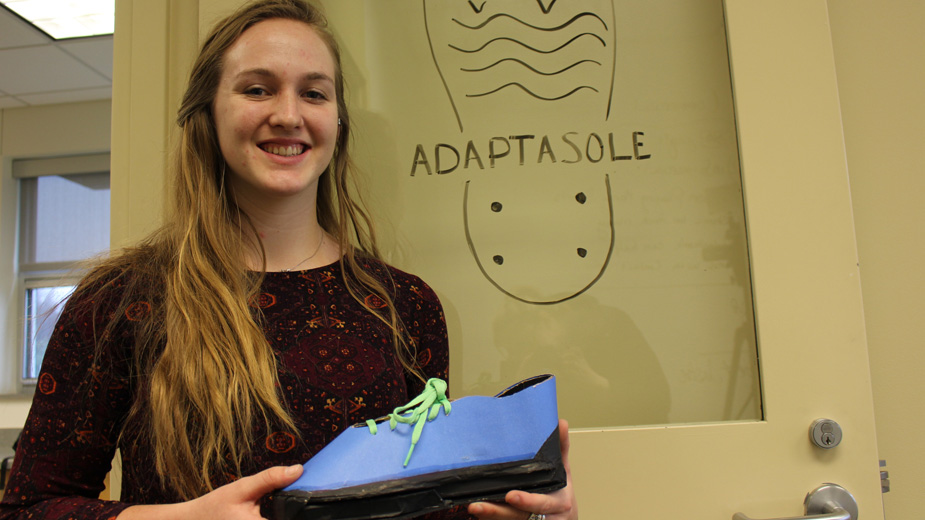
Pictured: Jocelyn Roth, CEO of Adaptasole.
“We’ve developed a product where you can switch out the sole, whether it’s a cleat, running or basketball sports shoe,” she says. The soles have an interlocking grip that slips onto the bottom of the shoe.
“I came to the academy because I want to be become engaged in international business,” Roth says. “This is a great way to understand how people go out and start.”
Eventually, Roth would like to work for a nonprofit that teaches others in underdeveloped countries about entrepreneurship and starting their own businesses. “I’ve been able to learn so many things,” she says.
Students who have a continued interest in pursuing their business ventures can apply for the academy’s latest program – a summer accelerator in which they’re paid $10 an hour over 10 weeks to further enhance their companies, Desai says.
The accelerator was made possible through a $90,000 grant from the Appalachian Regional Commission.
“This could be the future of education,” Desai says.
Copyright 2024 The Business Journal, Youngstown, Ohio.
